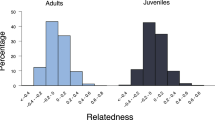Abstract.
In order to understand why animals are social and how group members interact with each other it is important to know their relatedness. However, few studies have investigated the genealogy in complete social groups of free-living animals with low reproductive skew. This holds particularly true for bats. Although almost all bat species are social, their sociobiology is not well understood. Because they are volant, nocturnal and have a rather cryptic life-style, bats are difficult to observe in the wild. Furthermore females are generally gregarious making genetic parent-offspring assignment a challenging task. We used genetic markers in combination with knowledge about age and colony membership of individually marked bats to construct pedigrees in completely sampled maternity colonies of Bechstein's bats (Myotis bechsteinii). Despite considerable fluctuations in population size, no immigration occurred over 5 years in four colonies living in close proximity. Additionally, confrontation tests showed that females of one maternity colony were able to detect and attempted to prevent the intrusion of foreign females into a roost they occupy. Although colonies were absolutely closed, and 75% of the colony members lived together with close relatives (r≥=0.25), mean colony relatedness was nearly zero (0.02). Average relatedness therefore is a poor estimator for the potential of kin selection in Bechstein's bat colonies and may be misleading when attempting to understand the social structure of animals living in groups where many members breed. Based on our results we discuss the potential adaptive value of living in closed societies with low reproductive skew.
Similar content being viewed by others
Author information
Authors and Affiliations
Additional information
Electronic Publication
Rights and permissions
About this article
Cite this article
Kerth, G., Safi, K. & König, B. Mean colony relatedness is a poor predictor of colony structure and female philopatry in the communally breeding Bechstein's bat (Myotis bechsteinii). Behav Ecol Sociobiol 52, 203–210 (2002). https://doi.org/10.1007/s00265-002-0499-6
Received:
Revised:
Accepted:
Issue Date:
DOI: https://doi.org/10.1007/s00265-002-0499-6




